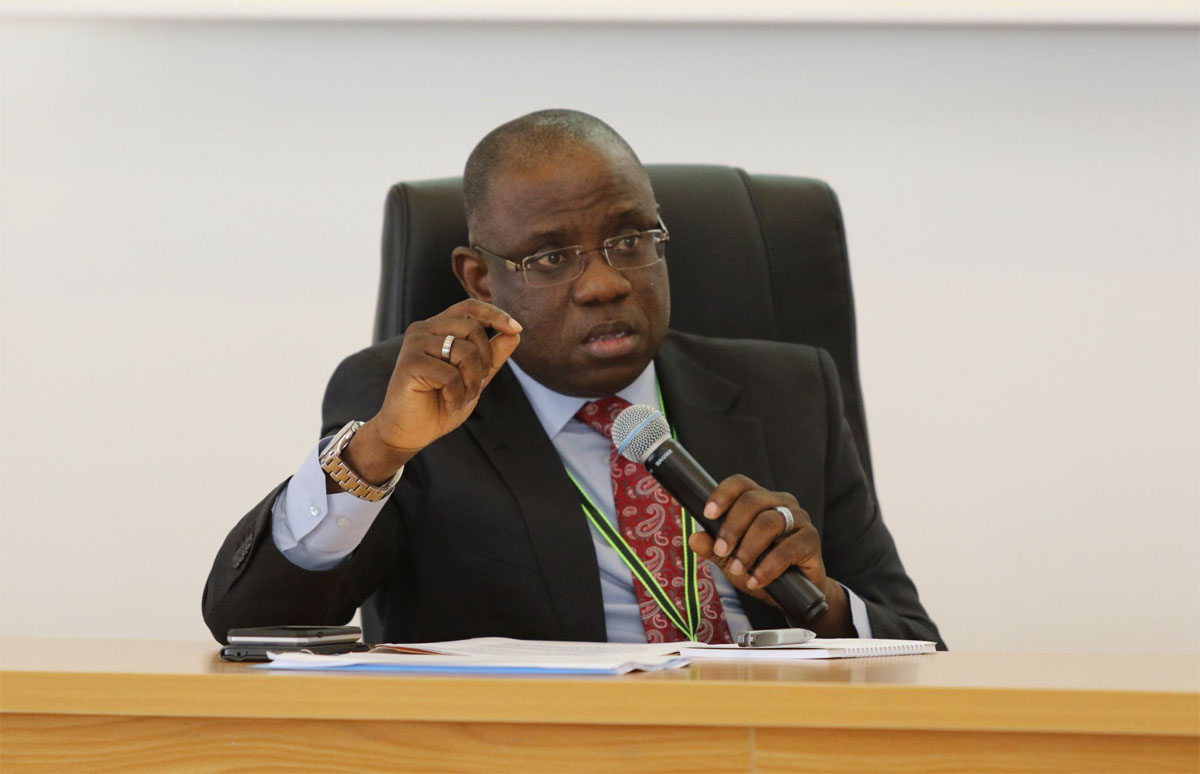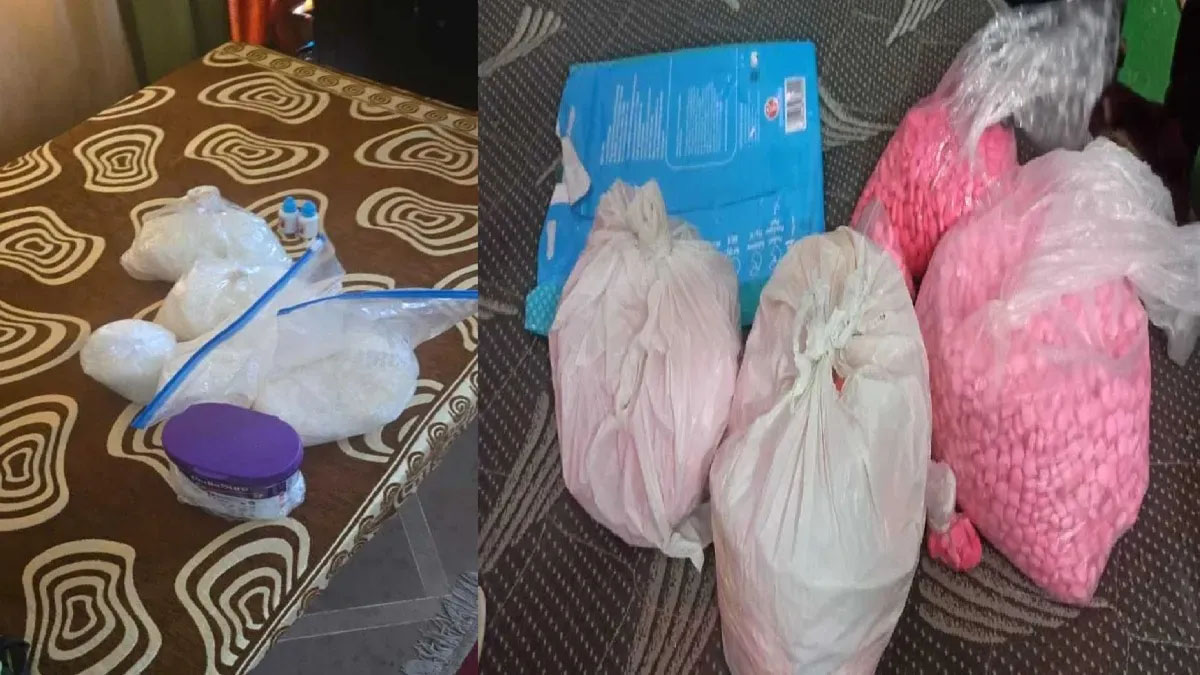metro
Buhari assures of drop in price of rice soon as PDP mocks president, APC over pyramids

President Muhammadu Buhari has assured that with expansion in rice farming, prices of food would be more affordable for all.
The president, who spoke at the official commissioning ceremony of Central Bank of Nigeria (CBN)/Rice Farmers Association of Nigeria (RIFAN) Rice Paddy Pyramids at the Abuja International Trade Fair Complex, said across Nigeria, more than 4.8 million smallholder farmers had been supported by Anchor Borrowers Programme (APB), with increase in production of 23 agricultural commodities, including maize, rice, oil palm, cocoa, cotton, cassava, tomato and livestock.
According to a statement by Special Adviser to the President on Media and Publicity, Femi Adesina, Buhari said rice production in Nigeria has increased to over 7.5 million metric tons annually.
“Prior to the introduction of APB, the average production in Nigeria between 1999 to 2015 was less than four metric tons annually. I am aware that the bags of paddy will be moving straight from here to rice milling plants across Nigeria, which led to the release of processed rice to the markets by the rice millers. The measure will aid our efforts at reducing the price of rice in Nigeria.
“Before this administration launched the ABP, there were only 15 standard rice mills in Nigeria. As at today, we have over 50 standard and integrated rice mills creating jobs and reducing unemployment. We expect additional significant output when two new mills are started in Lagos and Katsina,” he said.
The president said the large margins in the business of rice had also encouraged more people to show interest in investing in agribusiness.
“As a critical policy of the government, the ABP is expected to catalyse the agricultural productive base of the nation, which is a major part of our economic plan to uplift the economy, create jobs, reduce reliance on imported food and industrial raw materials, and conserve foreign exchange.
READ ALSO:
- Neighbours beat Osun housewife for bathing daughter with hot water over errand
- Fresh treason charges force shift of Nnamdi Kanu’s trial
- Lawan discusses fuel subsidy with Buhari, says President didn’t order removal
“In the implementation of the programme, adoption of high-yielding seedlings, quality inputs and best farming practices were essential features.
“For instance, the improved rice seedlings have helped to ensure our achievement of rice sufficiency, as they are disease-resistant and have an average yield of about five metric tonnes per hectare, compared with the traditional national average of 1.5 metric tonnes.
“This has resulted in bridging our rice consumption gap, a significant reduction in rice imports, and saved us foreign exchange,” he added.
The president said the commissioning of the rice pyramids was an indication that the country was making steady and assured progress towards self-sufficiency in food production.
“It is my desired hope and expectation that other agricultural commodity associations that are yet to participate under the ABP will emulate RIFAN in supporting our administration’s drive for food self-sufficiency.”
The president noted that about three years ago, the first set of sky-high pyramids of rice harvests were showcased in Argungu, Kebbi State, which was followed by another set in Minna, Niger State about a year ago and barely three months later in Zauro, Kebbi State, rice pyramids were unveiled.
President Buhari said in May 2021, the CBN unveiled the first rice pyramids in the South West of Nigeria in Ado Ekiti, Ekiti State.
“Those events were historic as, first, they remind us of our yesteryears’ agricultural commodity pyramids, such as the groundnut pyramids in Kano and secondly, they symbolise that we can produce what we eat.
“The significance of today’s occasion can be better understood by looking at the various economic strides the administration has achieved through agriculture.
“When we assumed the reins of leadership of this country in 2015, the administration identified the ABP as an essential policy instrument for achieving economic diversification through agriculture.
“To achieve this, the ABP was designed to encourage investments in agriculture and empower smallholder farmers as drivers of transformation in the agricultural sector and as critical enablers of economic growth.
“I am, indeed, delighted that the ABP continues to receive commendations, since its introduction six years ago, as it has become one of the reference points in the administration’s agricultural revolution effort.
“In fact, the programme speaks loudly in its giant strides as it has increased access to finance by our rural farmers, who, before now, were virtually excluded from the financial system,’’ he said.
President Buhari commended the CBN for its efforts at resuscitating the Nigerian Commodity Exchange following approval to do so.
RIFAN President, Aminu Goronyo, said more than 99 percent of the paddy rice for the year was already with farmers across the nation, while the bags in the 13 pyramids would be sold to further ease and augment production.
However, the Peoples Democratic Party (PDP) has accused the Federal Government of using the rice pyramids as media stunt ahead of the 2023 general election.
The PDP, in a statement by its National Publicity Secretary, Debo Ologunagba, said there was nothing to celebrate in the rice pyramids as it alleged that the bags of rice displayed were imported.
“Nigerians are already aware and the pictures abound of how the APC and its government ‘create’ fake pyramids of rice with sandbags and re-bagged rice stacked on pyramid shaped wooden structures as busted in an APC-controlled state in the South West in 2018.
“Of course, there is nothing to celebrate in the APC pyramid of lies in Abuja. It is rather shameful that APC leaders are again ridiculing President Muhammadu Buhari by making him unveil pyramids of allegedly imported foreign rice which are re-bagged as locally produced, just to create an impression of a boost in local production under his watch.
metro
Woman arrested for trafficking daughter for N50,000 to Mauritania

Woman arrested for trafficking daughter for N50,000 to Mauritania
Operatives of the Zone 2 Command of the Nigeria Police Force have arrested a woman whose identity was not disclosed alongside an accomplice for allegedly trafficking young girls to Mauritania as commercial sex workers for N50,000.
The Zonal Public Relations Officer, Umma Ayuba, disclosed in a statement on Tuesday that the suspects were arrested at their hideout in the Meiran area of Lagos State on March 22.
She disclosed that the syndicate worked with other accomplices in Mauritania to traffic young ladies as commercial sex workers.
According to Ayuba, the suspects confessed to the crime upon their arrest and interrogation.
Ayuba stated, “Operatives of the Zonal Intelligence Response Squad led by SP Francis Kpoughul stormed their base where two suspects were apprehended.
“The first suspect said she was introduced to a woman based in Mauritania by another woman, who has been prosecuted for the same offence and is currently serving a jail term.”
READ ALSO:
- Breaking: Tinubu sacks Kyari, appoints Ojulari as new NNPCL GCEO
- Kogi LG imposes curfew ahead of Natasha’s homecoming event
- Durbar ban: Sanusi drives in vehicle to pay Sallah homage
The ZPRO added that the first suspect confessed that she received a sum of N50,000 for each person, and among her victims was her 19-year-old daughter.
“She said the woman in Mauritania contracted her to recruit young girls below the age of 22 to be used as sex workers there.
“She added that she received N50,000 as a commission for each girl sent to Mauritania.
“She confessed that, among the girls she recruited, was her 19-year-old daughter. She also admitted to receiving over N500,000 from the woman in Mauritania.”
The second suspect was said to have admitted that she was contracted by the first suspect to recruit girls as domestic staff in Mauritania, but when she sent one victim to the first suspect, she rejected it.
The second suspect told the police further that she became suspicious after the victim she sent to the first suspect was rejected, and upon further questioning, she realised that the victims were to be used as sex workers.
The ZPRO continued. “She said that, upon further questioning, she discovered the girls were to be used as sex workers and decided to withdraw from the business.
“She added that the only girl she sent to the first suspect was rejected due to her age and body size. That was when she realised something was wrong.”
Ayuba concluded that the suspects would be charged in court upon the conclusion of an ongoing investigation.
PUNCH Metro reported on March 3 that the Ogun State Police Command arrested a 28-year-old woman, Opeyemi Adetoro, for trafficking three girls to Libya from the Oke Itoku area of Abeokuta, Ogun State.
The spokesperson for the state police command, Omolola Odutola, disclosed that the suspect was arrested after the mother of one of the trafficked victims reported to the police that her child had been taken to Libya without her consent.
Woman arrested for trafficking daughter for N50,000 to Mauritania
Punch
metro
Breaking: Tinubu sacks Kyari, appoints Ojulari as new NNPCL GCEO

Breaking: Tinubu sacks Kyari, appoints Ojulari as new NNPCL GCEO
President Bola Tinubu, in a sweeping reconstitution of the Nigerian National Petroleum Company, NNPC, Limited board, has sacked the Group Chief Executive Officer, GCEO, Mallam Mele Kolo Kyari, and the board chairman, Chief Pius Akinyelure.
President Tinubu also removed all other board members appointed with Akinyelure and Kyari in November 2023.
This was made public via a statement issued in the early hours of Wednesday by the presidential spokesman, Bayo Onanuga.
According to the statement, the new 11-man board has Engineer Bashir Bayo Ojulari as the Group CEO and Ahmadu Musa Kida as non-executive chairman.
The statement further stated that Adedapo Segun, who replaced Umaru Isa Ajiya as the chief financial officer last November, has been appointed to the new board by President Tinubu.
READ ALSO:
- Kogi LG imposes curfew ahead of Natasha’s homecoming event
- Durbar ban: Sanusi drives in vehicle to pay Sallah homage
- Tribunal fixes date to deliver judgment on Edo guber election
- JUST IN: Benue youths protest herdsmen killings
Six board members, non-executive directors, represent the country’s geopolitical zones. They are Bello Rabiu, North West; Yusuf Usman, North East; and Babs Omotowa, a former managing director of the Nigerian Liquefied Natural Gas (NLNG), who represents North Central.
President Tinubu appointed Austin Avuru as a non-executive director from the South-South, David Ige as a non-executive director from the South-West, and Henry Obih as a non-executive director from the South-East.
Mrs Lydia Shehu Jafiya, permanent secretary of the Federal Ministry of Finance, will represent the ministry on the new board, while Aminu Said Ahmed will represent the Ministry of Petroleum Resources.
Continuing, the statement said, “All the appointments are effective today, April 2.
Breaking: Tinubu sacks Kyari, appoints Ojulari as new NNPCL GCEO
metro
Four Nigerian students arrested after drug ring bust in India

Four Nigerian students arrested after drug ring bust in India
The India’s Narcotics Control Bureau (NCB), along with Delhi Police, busted a drug cartel, arrested five suspects including four foreign students from an “influential Nigerian family” and seized MDMA, high-quality crystal meth and Afghan heroin worth Rs 27 crore.
The raid was conducted in the Chattarpur area of Delhi on Monday, March 31, 2025.
Announcing the seizure in a statement on the social media platform X, Union Home Minister, Amit Shah praised the agencies, saying, “Our relentless hunt against the illicit trade continues.”
According to officials, the NCB and the Delhi Police’s Special Cell traced the source of the drugs to a rented accommodation of an African national, where the MDMA was being synthesised.
Five, including four African nationals belonging to an influential family of Nigeria, have been arrested, a senior MHA official said.
READ ALSO:
- Kogi LG imposes curfew ahead of Natasha’s homecoming event
- Durbar ban: Sanusi drives in vehicle to pay Sallah homage
- Tribunal fixes date to deliver judgment on Edo guber election
Acting on inputs about a high-quality methamphetamine transaction in Chhatarpur area, a joint team of NCB and the Special Cell intercepted a vehicle carrying 5.103 kg of crystal methamphetamine, valued at Rs 10.2 crore.
Questioning of the accused and technical tracking led them to an ‘African Kitchen’ in West Delhi’s Tilak Nagar, identified as the source of the contraband.
From this location, 1.156 kgs of crystal methamphetamine, 4.142 kgs of Afghan heroin, and 5.776 kgs of MDMA (Ecstasy pills) have been recovered, officials said.
Further probe led to a follow-up search at a rented apartment in Greater Noida from where 389 grams of Afghan heroin and 26 grams of cocaine have been recovered.
According to the officials, the accused are students of private universities in NCR and Punjab. Besides drugs, they are also suspected to be involved in cryptocurrency trade.
Four Nigerian students arrested after drug ring bust in India
-

 metro16 hours ago
metro16 hours agoBREAKING: Senator Natasha defies restrictions, arrives homecoming rally by helicopter [VIDEO]
-

 metro2 days ago
metro2 days agoHow they murdered my Kano-bound passengers in Edo
-

 International2 days ago
International2 days agoIn pictures: Eid celebrations around the world
-

 metro23 hours ago
metro23 hours agoUromi: Edo residents flee towns over likely reprisal attack, arrest
-

 metro22 hours ago
metro22 hours agoBreaking: ‘Cancel your homecoming’ — Police tell Senator Natasha
-

 metro2 days ago
metro2 days ago‘I was offered N5bn bribe to impeach Fubara’
-

 metro2 days ago
metro2 days agoKano Gov Yusuf, Sanusi linked to Eid killings
-

 Sports2 days ago
Sports2 days agoNigerian boxer collapses, dies in ring during fight in Ghana













